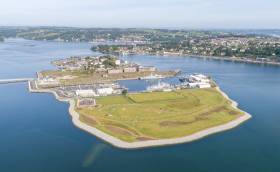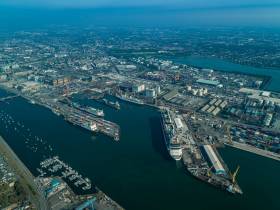Displaying items by tag: Engineers Ireland
Renewable Energy Development Among Hot Topics for Discussion at Engineers Ireland National Conference Next Week
The importance of renewable energy to Ireland’s future is among the topics that will be discussed at next week’s Engineers Ireland National Conference.
Time for Inspiration, Engineering Innovation and Leadership is the theme of this year’s conference, which will be held at the O’Reilly Hall at University College Dublin on Wednesday 25 October and will hear from a range of influential thought leaders on the role engineering is playing, and can play, in key areas of our society.
Decarbonising Ireland’s energy infrastructure will be the focus of contributions from Dr Tanya Harrington, chair of Renewable Energy Ireland, who will provide an up-to-date picture of how renewable energy is developing in Ireland and what changes are required over the coming years to achieve an effective transition to a net zero future.
Other presenters relevant to Afloat.ie readers include Niall Gleeson, CEO of Uisce Éireann (formerly Irish Water), who will address the engineering challenges the company encounters while protecting Ireland’s water supply and providing a safe, secure and sustainable water system to a rapidly growing population.
And Seán Atkinson, managing director of ESB International, a leading global engineering consultancy with experience across 120 countries, will speak about the provision of services in transmission and distribution, thermal and renewable power generation, utility management and strategic advisory while placing focus on transition to low-carbon solutions.
Details of the day’s other speakers can be found on the Engineers Ireland website, and tickets for Engineers Ireland members to attending this premier learning and networking event priced at just €30 can be purchased HERE.
Transformation of Haulbowline Island, Cork Harbour Voted Best National Engineering Project
The East Tip Haulbowline Island Remediation Project in Cork Harbour, was voted the National Engineering Project of the Year for 2019 at a ceremony held in Dublin.
As Afloat previously reported, Engineers Ireland invited members of the public to cast their vote in the shortlist of projects nominated in the awards' flagship category.
According to Engineers Ireland, the project in Cork Harbour was conducted by Cork County Council, RPS, PJ Hegarty & Sons and the Department of Agriculture, Food and the Marine.
The local authority engineering project that transformed the East Tip on the island (opposite Cobh) took the the lead at the 2019 Engineers Ireland Excellence Awards held in association with the ESB.
The remediation project, delivered on time and under budget, has seen 22 acres of the island’s East Tip transformed from a desolate, toxic, industrial site into a magnificent public recreational facility for local residents, workers and visitors in what has been one of the biggest environmental works in the history of the state.
The site at Haulbowline Island in Co Cork, formerly the home of Irish Steel, has been used for waste disposal for decades, with an estimated 650,000 cubic metres of slag and other waste metal from the steelworks deposited on the site from the 1960s until steel making ended at the plant in 2001.
Adopting the most innovative and customised engineering solutions throughout to overcome many challenges, the East Tip now boasts new playing pitches, walkways, cycleways, seating areas and the planting of hundreds of trees, woodlands and wildflower areas.
The Engineering Project of the Year category is sponsored by Transport Infrastructure Ireland and is voted for by a panel of judges and the public.
To read much more on the project click here (scroll down) to sub-heading: 'Immensely Challenging'
Engineering Projects in Dublin Port Among Award Shortlist: Public Invited to Cast Vote
Two projects in Dublin Port have been shortlisted for the 'Engineering Project of the Year' and both are located within Alexander Basin which is undergoing a major redevelopment as part of the port's Masterplan 2040.
The port projects shortlisted are Ocean Pier Berth 31-34 (see: another 'Brexit-Buster) located to the east of Alexandra Basin and a new Ro-Ro Jetty. The latter is sited on the opposite west side of the basin nearby to the Tom Clark Toll-Lift Bridge, otherwise widely known as the East-Link.
Construction of these particular projects within the Alexandra Basin Redevelopment (ABR) works were carried out by Keating as part of the Roadbridge Keating Joint Venture which has been shortlisted at the Engineers Ireland Excellence Awards 2019.
The Awards recognises the highest level of achievement in the engineering field and provides peer recognition of outstanding Irish engineering work.
Engineers Ireland is calling on the Irish public to vote online for what they consider to be the Engineering Project of the Year. To take part, voting must be cast before the deadline of (tomorrow) midnight, Friday, November 8, 2019. To find out more about casting your vote click this link.































































